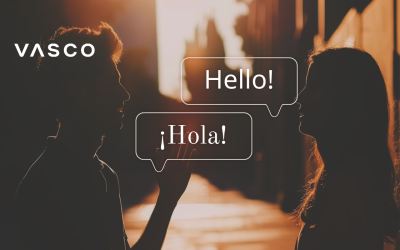Language learning is surely an interesting direction in one’s self development. However, it may also be quite challenging. Memorizing new words, studying grammar rules, and practicing correct pronunciation can be really tough. Not to mention acquiring conversational fluency in the language of your choice.
Fortunately, there are lots of helpful tools that will make language learning easier and more enjoyable.
In this article, we’ll explain how to learn a new language fast, along with presenting the methods of studying that can provide the best results.
Nevertheless, you may also be the person who finds language learning too difficult. Not a problem at all! We will present an alternative to language learning which is extremely helpful.
FAQ:
How can I teach myself to learn a language?
What is the easiest way to learn a language?
Which language is easy to learn?
How long does it usually take to learn a new language?
What are the best ways of learning a new language?
Why can’t I learn a new language?
Can you really learn a language in 30 days?
How long should it take to learn a new language?

Language learning — is it really so important?
When it comes to the significance of language learning in today’s world, most people are likely to mention English. It dominated the world of business, technology and culture, thus, speaking it is a great skill to be included in one’s resume.
Nevertheless, it is definitely worth learning more than one language.
85% of the world’s population are, hovewer, not native speakers of the English language. It means that knowing a foreign language, in addition to speaking your native one, may really be a huge advantage when it comes to progressing in your career.
Language learning also opens doors to more opportunities, such as understanding other cultures, studying with foreign online educational materials or watching TV series that are not in your native language. As a matter of fact, according to News Medical, language learning can improve both brain functioning and mental health! That’s a pretty big benefit.
However, it goes without saying that language learning may be a very difficult process.Therefore, various language learners and teachers have come up with useful ways of studying.
So, what are the best ways of learning a new language? We’ll also answer the question of how to learn a new language fast.
Before we start speaking about specific methods, let’s focus on how long does it take to learn a new language?
It all depends on, for instance, your age, difficulty of a given language, or the learner’s aptitude. You may also want to assess a given language’s difficulty before learning as some of them are more difficult than others.
The results of foreign language learning are usually aparent after 2 or 3 weeks of studying. However, the initial progress may be misleading…
In order to become a fluent speaker, you will porobably have to study hard for about a year. There are, however, ways to speed this process up and make it more enjoyable.

Having mentioned the benefits of language learning, in addition to estimating how much time it may take to learn a new language, it’s now time to plan it all. Let’s go through the most important steps of learning a foreign language.
Step one: set a goal
This can be a simple assumption, such as “I want to learn Spanish at a basic level”, or a more ambitious goal, such as “I want to learn Spanish so that I can feel like a native speaker”. Either way, setting a goal will keep you motivated.
Remember to evaluate your achievements on a regular basis. For example, after a few weeks of study, set the following goal: “I will be able to have a simple conversation in Spanish with some language partner.” This way, you’ll see progress. Of course, it will be much easier if you choose a language teacher to watch over you.
Getting immediate feedback is also important and language teachers provide you with it.
Step two: get help from language teachers
Find people who are fluent in your target language and learn from them. Ask about their experiences with learning foreign languages — what they did, what challenges they faced, and how long it took for them to reach a certain level.
This will help you plan an educational plan in your own life, and your goals will likely be more specific.
Step three: create a weekly plan and set specific study times
Set small milestones. For example: “I will do at least 10 grammar rules tasks during the week” or “I will read at least 5 articles in my target language”. This will help you feel that you are making progress.
It is also worth setting one specific hour for learning, if possible. That way, you’ll get your brain used to entering the right mode and learning a foreign language will be way faster!
Break your goals into small steps
Language learning can be overwhelming. So break it down into easy-to-learn pieces, such as basic vocabulary and phrases, simple grammar rules, and short conversations.
Use the breakdowns in the textbooks to divide your work into appropriate segments. This will help you avoid feeling overwhelmed.
Start speaking a foreign language
Whether we like it or not, learning languages consists in gaining communicative fluency. Try to say at least one or two sentences each day and make a video to watch later.
This will help you catch mistakes in your pronunciation and will also involve the two hemispheres of your brain, which will translate into learning faster. What’s more, when you browse the videos from old to new later, you’ll notice your progress!

What are the best ways to learn a new language?
Let’s take a look at the most popular ways of language learning and determine, which are the best ones.
Below we list the most popular ones, taking into account who they’re best for, how much time per week they can take, and what other methods are best to combine them with.
Immersion language learning or immersion environment
This may be the best method of learning a new language. Not only does it consist in continuous exposure to the language that interests us, but is also recommended by many language learning experts.
Unfortunately, not everyone can actually afford to study or even move abroad. A compromise may, however, be to frequently listen to a foreign radio or to watch a foreign TV. You can also arrange conversations with native speakers of the language you’re learning.
In that last case, we highly recommend an app called “Tandem”. Thanks to this app, you will find a person who is interested in a language exchange. Finding other language learners lets you practice speaking skills.
Who this method is best for? For students who can participate in the study abroad program or people who simply want to move to another country.
Advantages: it’s efficient, quick, and holistic (you learn many aspects of the language at once)
Disadvantages: you may need to move abroad, takes a lot of effort
How much time is needed: all day in case of moving abroad and a few hours a day in your home country
Other methods that can help: online materials, application for language learning and language exchanges.
Foreign language course or private lessons
Finding a good language teacher is a traditional but still irreplaceable method of learning a foreign language. They will provide proven learning materials, practice correct pronunciation with you and guide you through the learning process. After all, they were once learners themeselves and know what works and what doesn’t.
Who is this for? This method is for anyone who can spend at least two days a week on classes. You can also choose a language course to maintain contact with other language learners. If you, however, prefer the comfort of your own home or just a 1:1 contact with a language teacher, it is definitely worth looking for a good tutor.
Advantages: you get a support of an experienced person.
Disadvantages: moderate pace of learning, necessity to work outside the classroom, may be problematic to find a good teacher (especially for less known languages)
How much time is needed: From 2 to 5 days a week
Other methods that can help: it may be necessary to use all other methods of language learning when you’re outside the classes.
Online resources
This is definitely a good alternative to learning with a textbook. Nowadays, we can find a multitude of online resources. They are, for instance, language classes, games, or simply watching foreign videos and reading articles in a foreign language.
Nevertheless, working with digital materials is no substitute for face-to-face learning with a teacher of a target language. It is, however, a compulsory addition to language learning with any other method. This method is for everyone, but above all, for people who like technology or individual learning. You will probably need to spend at least 1 hour a day on studying.
Language learning apps
Apps are becoming more and more popular when it comes to learning a new language. Some of the best language learning apps include Duolingo, Memrise and Busuu.
Duolingo is free and available for both desktop and mobile devices. It provides you with courses in over 20 languages. Memrise is also free, and gives you studying resources in over 50 languages. If you are interested in a higher-level foreign language course, then Busuu is a good idea. However, you will probably need to subscribe to access better learning resources.
Remember that the best results can be obtained in combination with other methods of learning a language. It’s best to combine them with, for instance, foreign language course, textbooks or immersion environment.
These applications by themselves can help us, at best, to learn a small pool of vocabulary, simple grammar rules and, more or less, pronunciation.

Why can’t I learn a new language? Or why there are better language learners than me?
The claim that everyone can learn a foreign language is untrue.
Not everyone can meet requirements for language learning. For example, some people are better adapted to visual-verbal learning, while others learn only verbally. Some people, on the other hand, learn best by combining new information with what they already know. Comparing oneself to other language learners is also a useful method of learning a new language.
Therefore, learning a foreign language from scratch can be very problematic for many people. Not to mention the fact that if your goal is to travel or interact with clients from around the world, you may need to know many languages at once!
Fortunately, nowadays, language learning is not the only solution we have. We can reach for an electronic translator — a device that usually includes the knowledge of several dozen languages, or even more!
Such a standalone translation device is definitely worth getting, even if we are used to using online solutions. Why?
- Most of them have free Internet access all over the world thanks to the built-in SIM card. So, no matter where we travel, we do not have to worry about additional roaming costs.
- Electronic translators are much more precise than online translators.
- Such a device usually has a strong battery, thanks to which we do not put additional strain on the battery of our phone while traveling.
An example can be Vasco Translator V4 universal translator. It connects to the Internet for free in almost 200 countries and supports 76 spoken languages. Thanks to this, you will communicate with over 90% of the world’s population!
And even if learning foreign languages is still your goal, this device can also help you. It includes a language learning app that uses flashcards — there, you can choose from 28 different languages!
So, what are the best ways to learn a foreign language?
The best ways to do so are the ones that fit your lifestyle and educational goals. Foreign language course, tutoring, or even watching YouTube videos — these methods can definitely help. Not to mention learning grammar rules from a textbook or practicing with a phrasebook.
However, no matter what your preferences are, the most effective method is to use the language in everyday life and get the support of native speakers.
If you find learning a new language difficult, that’s also fine. Remember that for work and travel, you have the option of using electronic translaton devices. You can take them anywhere you want and sucessfuly speak with a vast majority of the world’s population.
In a nutshell:
Language learning is an interesting direction in one’s self development, but it can also be quite challenging. This article explains how to learn a new language fast, along with presenting the methods of studying that can provide the best results. It is important to set a goal, get help from language teachers, create a weekly plan, and start speaking the foreign language. The most popular ways of language learning are immersion language learning, foreign language courses, online resources, and language learning apps. Not everyone can learn a foreign language, but electronic translators can be useful for travelers.











